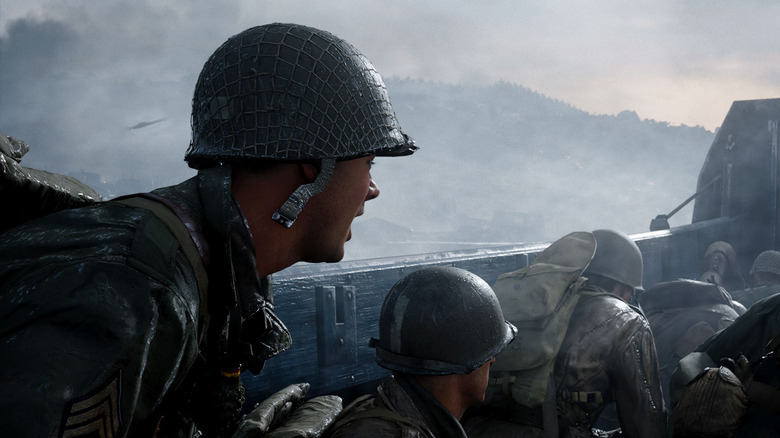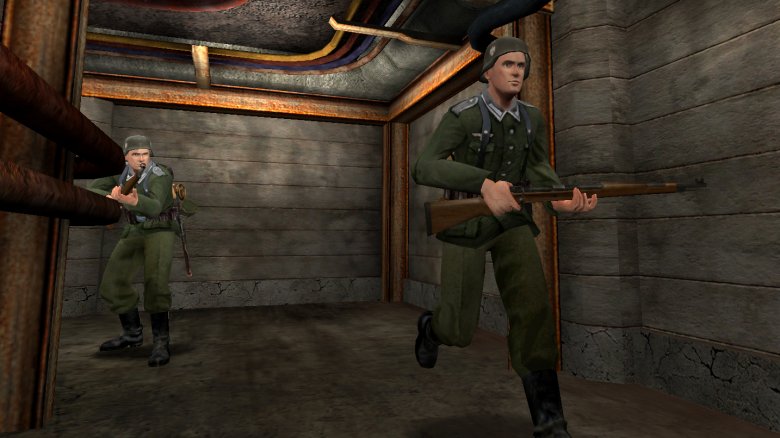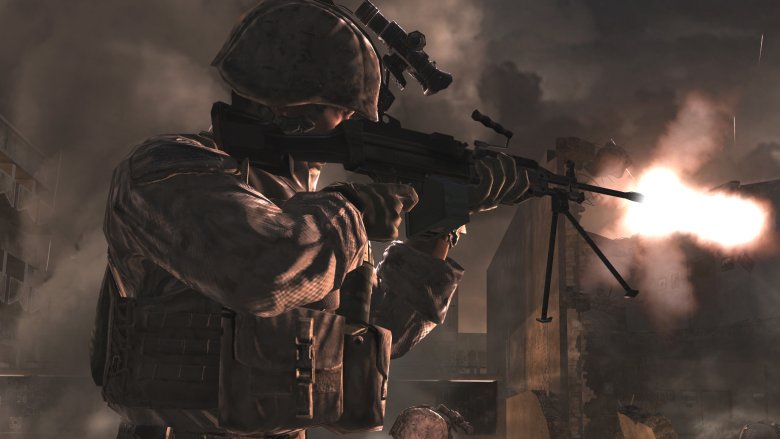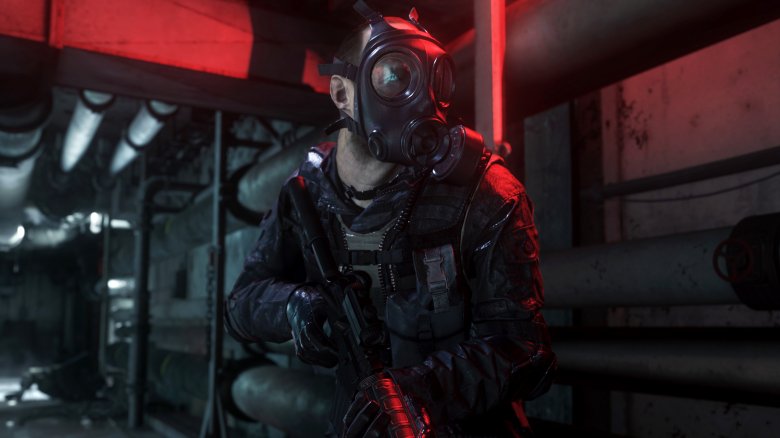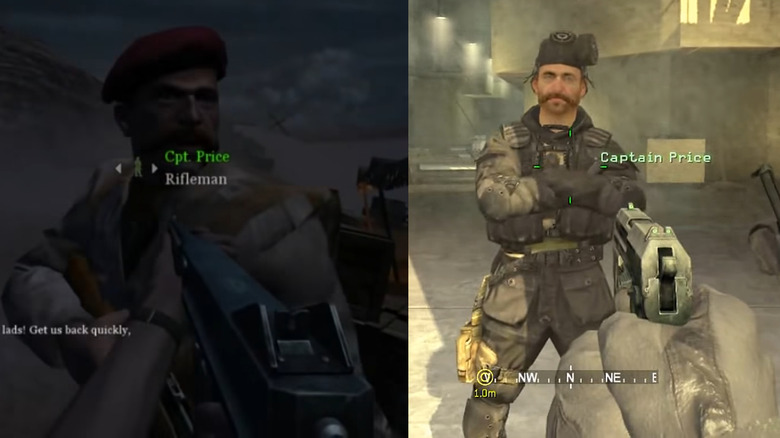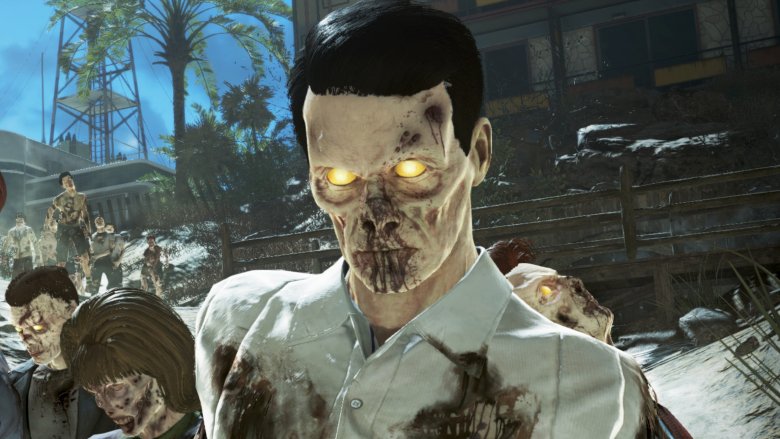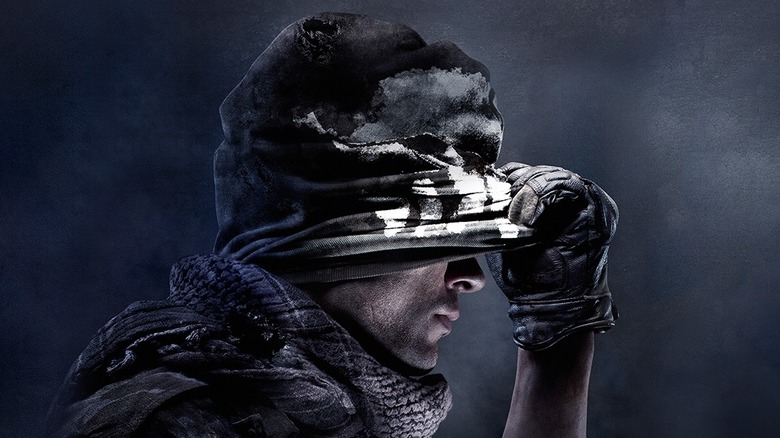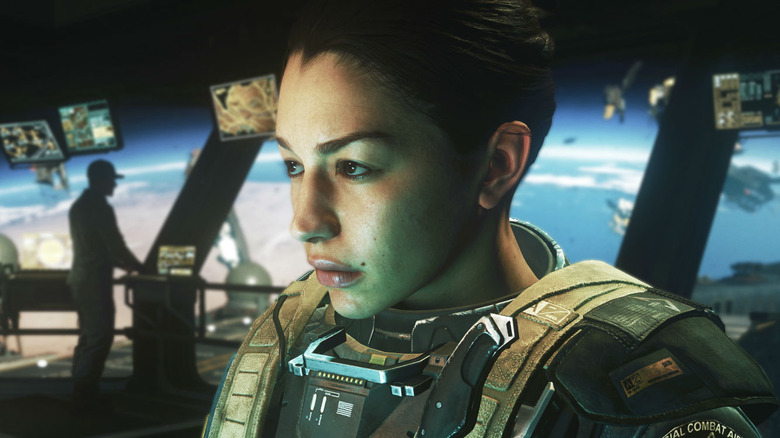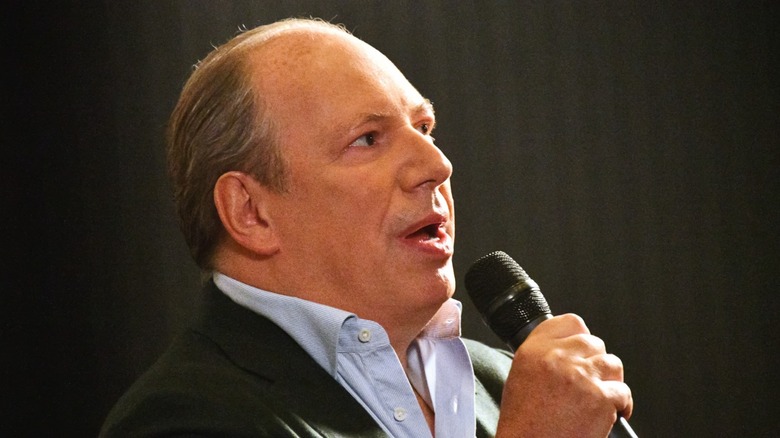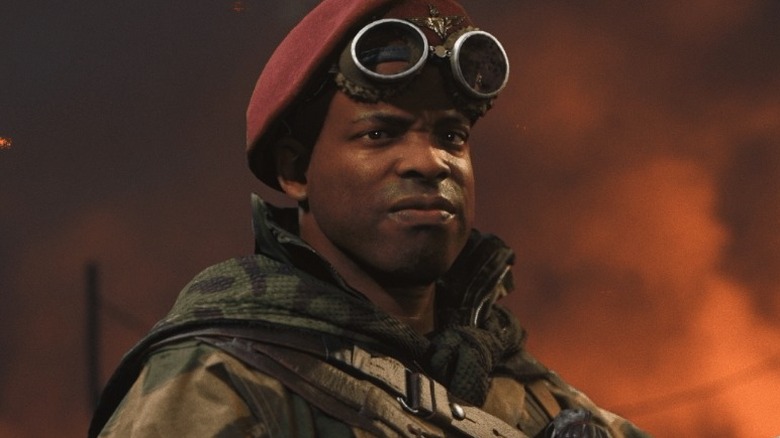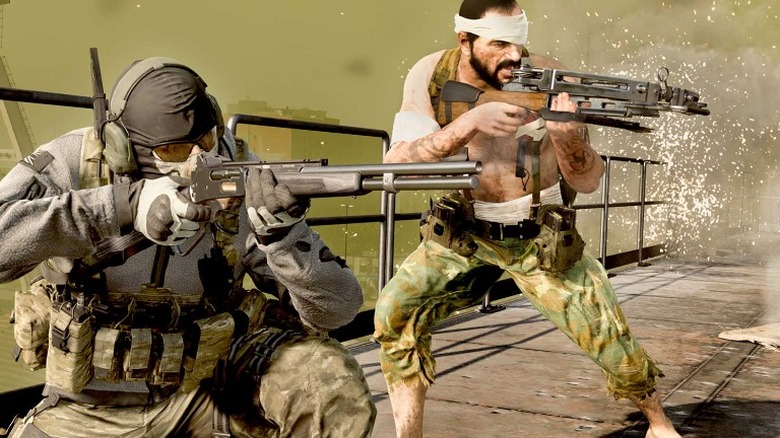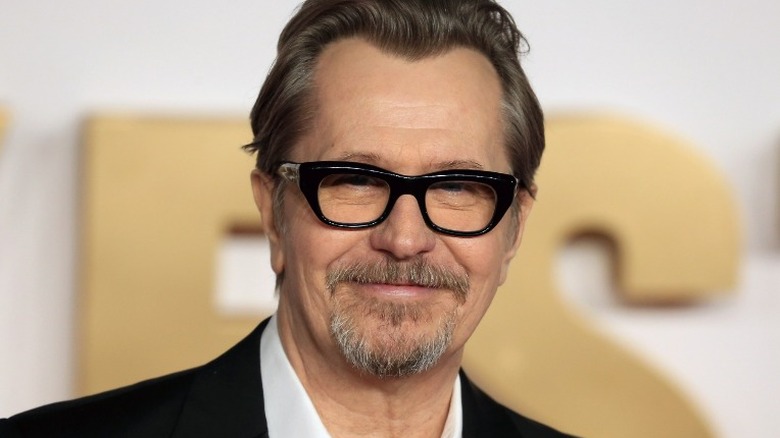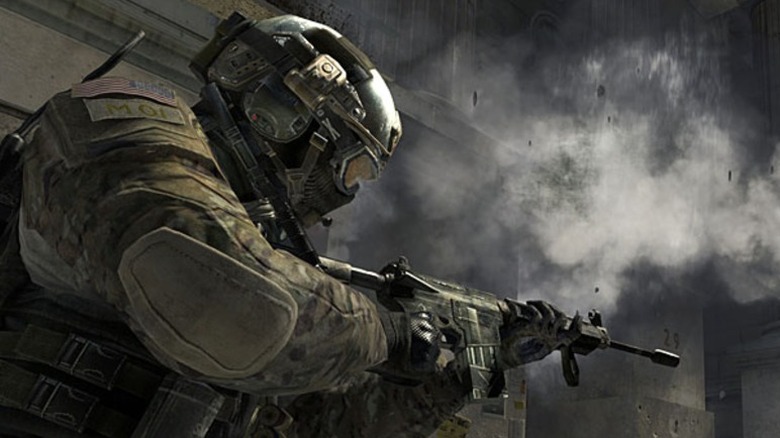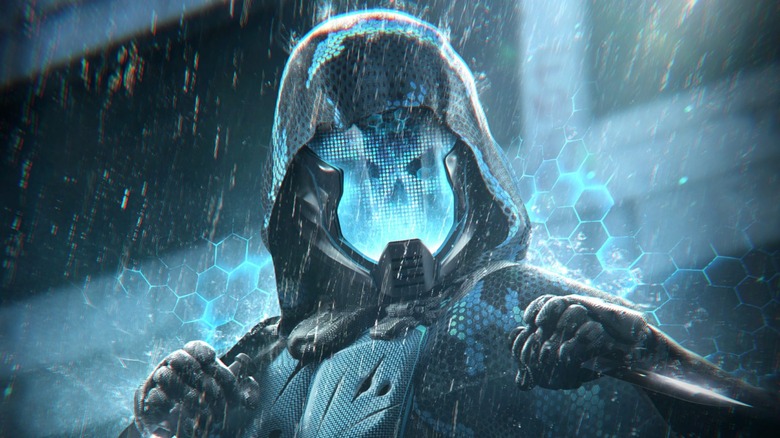What Only True Fans Know About Call Of Duty
When the original game came out in 2003, it was just another World War II shooter in a crowded marketplace from an unknown developer. But over the years, "Call of Duty" has grown into the biggest action franchise in all of gaming — and arguably, all of entertainment. It's gone from the beaches of Normandy, to the jungles of Vietnam, to the far reaches of the solar system.
But did you know the mission that kicked the whole thing off didn't have a gun at all? Or that Captain Price is a whole lot older than he looks? Here are a few things you might not have known about Call of Duty.
The original developers came from Medal of Honor
In the early years of the millennium, "Medal of Honor" owned the burgeoning World War II subgenre. The original game, published by EA in 1999, introduced a realistic take on the conflict, and its success made it an instant franchise. The third game, "Allied Assault," is often cited as the highlight of the series. The two guys in charge of "Medal of Honor" at that time were Jason West and Vince Zampella. Sound familiar?
Immediately after the release of "Allied Assault," the two of them formed a brand-new studio: Infinity Ward. EA's chief rival, Activision, saw an opportunity to compete in the World War II space, and bought a 30 percent stake in the new company right away. In other words, EA lost their best shooter talent straight to their competitor. Infinity Ward got straight to work on their first game, called "Call of Duty." "Call of Duty" and "Medal of Honor" would go head-to-head against each other for the next ten years, though in the end, only one would emerge victorious.
The series was supposed to be modern from the start
"Allied Assault" was the third game in the "Medal of Honor" series, and EA had no intentions of stopping there. Sequels were already in development, and they had also just acquired "Battlefield 1942." Meanwhile, rival studios were hard at work making their own World War II games to jump in on the craze. It seemed like the Second World War was getting really crowded, really fast.
Because of that, the Infinity Ward team initially wanted to jump off the bandwagon and make a game set in the modern day. A modern-era game would allow them to explore contemporary themes, such as how warfare had changed in a post-9/11 world. However, their new owners at Activision wanted a repeat of "Allied Assault" in terms of success. So it was back to the European theater as the team's first game, "Call of Duty," became yet another World War II shooter. But on release, that first Call of Duty became the crown jewel of the subgenre, making full use of scripted sequences to craft a cinematic feel that no other game could touch. Infinity Ward might have been forced into World War II again, but they proved they were still the masters of the period.
One of the series' best missions gives you no gun at all
Where "Medal of Honor" was always focused on the American experience, the original "Call of Duty" in 2003 opened up World War II to other nations. This included the Soviet Union, and in the very first Russian level, the designers crafted a bold limitation: the player never gets a gun at all. Playing as a Russian conscript just entering into the Battle of Stalingrad, the level starts with the gamer sitting in a boat, dodging German strafing runs. Even once the boat finally makes it to the opposite shore of the Volga River, the player is only handed... an ammunition clip. No rifle, no pistol, no nothing, just a clip.
And indeed, for the entire rest of that mission, the player is merely running around, hoping that a German artillery shell doesn't get too close. This was a reference to the fact that, early in the war, the Soviet Union had more soldiers than guns to arm them with. Few other war games have ever dared to have a mission where the player is so helpless, and yet, of all the many single-player missions in the "Call of Duty" franchise, this first Stalingrad mission remains one of the best-remembered and most-beloved of them all.
The multiplayer is secretly an RPG
Games within the RPG genre are usually marked by their science-fiction or fantasy settings, reflecting their "Dungeons & Dragons" heritage. They also typically involved a deep story with rich characters set in a broad, explorable world. None of this has anything to do with the multiplayer of a shooter game, in which players, well, just run around and shoot each other. But when the "Call of Duty" series jumped into the current era with 2007's "Call of Duty 4: Modern Warfare," it was, secretly, an RPG. Not in its single-player campaign, which was linear, short, and devoid of deep characterization, but in its multiplayer. That's because RPGs had one other defining feature: upgrades based on experience, loot, and abilities.
The "Modern Warfare" team took the heart of the RPG upgrade path and translated it into shooter games for the first time with levels (experience), unlockable weapons (loot), and a series of 'perks' (abilities). Yes, it involved soldiers with rifles, and there weren't any dragons in sight, but in this key respect, "Modern Warfare" was inspired by games like "World of Warcraft" as much as "Medal of Honor."
Captain Price is the grandson of... Captain Price
One of the best-known characters from the "Modern Warfare" sub-series of "Call of Duty" games is Captain Price, the no-nonsense SAS team leader. Gruff, tough, and possessed of a near-bulletproof mustache, Price remains a standout of the entire franchise. But did you know he was originally introduced in the very first "Call of Duty," which was set in World War II?
We first meet him in the very first British mission, when a team of paratroopers drops into Normandy on D-Day to take Pegasus Bridge. And in fact, in "Call of Duty 2," Price appears even earlier, during the North African campaign. So how, then, does that mustache survive all the way to the modern era? Infinity Ward has never offered an official explanation, but the common consensus is that Captain Price is the grandson of, uh, Captain Price. Of course, it's also possible that the developers just liked the character, and brought him back for their modern-era games. Or who knows? Maybe Captain Price really is immortal. And never, ever gets promoted.
Zombies came late to the series -- and from another developer
"Call of Duty" titles are really several games in one: a heavily-scripted, linear campaign; a competitive multiplayer experience; and a co-op zombie mode, in which players take the role of zany characters fighting the undead. But the latter wasn't always the case! In fact, the undead never rose until 2008's Call of Duty: World at War, which didn't come from Infinity Ward at all.
To have a "Call of Duty" game every year, parent company Activision had tasked their studio Treyarch with making Call of Duty games between Infinity Ward's releases. At first, these Treyarch games didn't review or sell as well as the Infinity Ward releases. But for "World at War," a small team within Treyarch decided to make a zombie mode, even though this was never approved or scheduled. Afraid that fans would hate it, Treyarch decided to make the mode an easter egg: a hidden feature only unlocked under certain conditions. But the zombie mode became a sensation, and it's been a staple of the Treyarch games, and indeed the entire franchise, ever since.
The original developers were fired, and Infinity Ward has never been the same since
The franchise's utter dominance over the industry began with the massive success of 2009's "Modern Warfare 2," made by the original developer, Infinity Ward. But in March of the following year, the studio founders, Jason West and Vince Zampella, were unceremoniously fired by parent company Activision. Various accusations have flown back and forth as to what happened, but it seems clear that the relationship between the duo and Activision had been fraying for a while. When they left, they founded a new company, Respawn, and took a significant number of Infinity Ward employees with them.
The resulting chaos left the next Infinity Ward game, "Modern Warfare 3," in deep trouble, forcing another studio called Sledgehammer to step in and help them finish the product. While "MW3" continued the series' record-breaking streak, none of Infinity Ward's follow-up titles have met with the same success. "Call of Duty: Ghosts in 2013" was a sales disappointment, and 2016's "Call of Duty: Infinite Warfare" significantly underperformed its expectations. Though Infinity Ward created the franchise altogether, taking it from initial concept to global juggernaut, it just hasn't been the same without its founders at the wheel. However, they continue to work on the series, so parent company Activision still has faith that the company can find its footing again. That paid off in 2022, when the rebooted "Modern Warfare 2" became the fastest-selling game in the series (per Barron's).
Ghosts was originally supposed to have a sequel
When Jason West and Vince Zampella left Infinity Ward in 2010, "Modern Warfare 3" was already in the early stages of production. So even though they left, the outlines of their vision were still baked into the game. "Call of Duty: Ghosts" in 2013 marked the first time that Infinity Ward created a game from scratch without their original leaders. The intention was that "Ghosts" would be a clean break from the "Modern Warfare" era and the controversy around the departures, and start a whole new sub-franchise in the "Call of Duty" lineup. There was only one problem: "Ghosts" turned out to be a critical flop, and outlets even called on Infinity Ward to drop it as a series.
With a weak campaign and subpar multiplayer, "Ghosts" simply didn't measure up to the standards of the biggest action franchise in gaming. The game's comparatively low sales sealed its fate, and any hope of a Ghosts 2 was shelved. Infinity Ward instead went into space with 2016's "Call of Duty: Infinite Warfare," which was also intended to start its own new sub-franchise. But again, low sales have probably scuppered those plans for good.
Call of Duty helps level up real soldiers, too
The franchise had a major year in 2009, as "Modern Warfare 2" released to massive sales and mainstream recognition. But in addition to all the play, the series got serious, too. That same year, parent company Activision founded the Call of Duty Endowment, a non-profit organization dedicated to helping real-world veterans find jobs.
The mission of the endowment is to find and fund existing organizations that are best able to connect returning veterans to open jobs. While the Endowment is open to donations, the bulk of its money comes from Activision itself, as a portion of the franchise's sales. To date, the series has provided over $25 million to the Endowment, which has helped over 37,000 vets. It's a lot of fun blasting around fictional warzones without any actual danger to yourself. But turning that combat fantasy into actual help for real heroes is one of the best things "Call of Duty" has ever achieved. Now that's a perk.
Oscar winners have contributed music to the franchise
While the music of the "Call of Duty" series may not be the series' main draw, some very high-profile composers and musicians have contributed to the franchise in the past. One prominent example is Jack Wall, the composer who scored "Call of Duty: Black Ops Cold War" and had previously worked on "Mass Effect" and "Splinter Cell." Meanwhile, the woman responsible for the soundtrack of "Prey" and multiple "Assassin's Creed" games, Sarah Schachner, also has worked on the series in the last few years.
Hans Zimmer was responsible for many of the songs in the "Call of Duty: Modern Warfare 2" soundtrack. Zimmer has composed music for films such as "The Dark Knight" trilogy and "Gladiator," winning Academy Awards for "The Lion King" in 1995 and "Dune" in 2022. Rolling Stone reported that Trent Reznor of Nine Inch Nails contributed the main theme to the "Call of Duty: Black Ops 2" soundtrack. Along with long-time collaborator Atticus Ross, he won the Academy Award for "The Social Network." Lastly, "Up" and "The Batman" composer Michael Giacchino was the man behind the score for the original 2003 game "Call of Duty." Each of these composers have brought a cinematic quality to the long-running franchise.
Arthur Kingsley was based on a real person
Arthur Kingsley is one of the four playable characters in "Call of Duty: Vanguard." A lieutenant in the British army, he joined the military after leaving Cameroon to study at the University of Cambridge. Deployed to fight against the Nazi occupiers of France as part of the British Expeditionary Force, Kingsley also fought at Dunkirk. He was a participant in the Normandy landings and leads a special forces group during the game's campaign. What many people might not realize is that Kingsley was inspired by a real-life soldier.
According to Sky News, the character was based on Sergeant Sidney Cornell, a Black soldier who fought during the Second World War. In real life, Cornell won the Distinguished Conduct Medal after showing extreme courage while delivering messages under heavy enemy fire. He was used as inspiration for the new character because Sledgehammer games wanting to offer different perspectives on what was a truly global war involving people of all walks of life. Kingsley marks the first-ever Black lead character in the history of the franchise.
The team behind COD takes weapon design seriously
The "Call of Duty" franchise has often been praised for the way it realistically depicts the weapons players can use. That's no mean feat, especially when considering how many guns each game usually has. For example, at launch, 2022's "Call of Duty: Modern Warfare 2" included more than 55 guns, grenades, and pieces of equipment in total. Making them all look, sound, and handle like they would in real life is not an easy task.
In a process known as photogrammetry, the team captures countless pictures of an object from every possible angle. These photographs are then taken and analyzed to create a high-definition in-game representation of the item that is more accurate than would be possible by creating traditional models (via The Washington Post).
Yet, the method goes further than that, as designers also speak to soldiers and other researchers to gather as much information as they can. As noted by Business Insider, the series' developers consult with experts to ensure that every weapon is believable and behaves accurately. According to Inverse, audio engineers even recorded guns firing to get more authentic sounds and bullets have proper physics so they fly through the air in a realistic manner.
You may have recognized some of the voices in the COD games
With so many "Call of Duty" games out there — each one usually featuring a full story mode with dozens of characters — it shouldn't be surprising that some high-profile actors and celebrities involved in portraying them over the years.
However, that doesn't mean that you won't have recognized some of the voices in the various titles. For instance, "Game of Thrones" star Kit Harington voiced the villainous Salen Kotch in "Call of Duty: Infinite Warfare," while Jeff Goldblum took on the part of Nero Blackstone in the Zombies mode of "Call of Duty: Black Ops 3." Former "Batman" star and "Birdman or (The Unexpected Virtue of Ignorance)" actor Michael Keaton had a small part in "Call of Duty: Black Ops 2" as Jason Hudson. A few years earlier, Ice Cube lent his voice to the character Joseph Brown in "Call of Duty: Black Ops." Other big name actors to lend their talents to the series have included Timothy Olyphant, Gary Oldman, Idris Elba, and Kiefer Sutherland.
Modern Warfare 3 made more money than Avatar
The "Call of Duty" series is one of gaming's biggest success stories. A report from Dot Esports indicated that the franchise has earned a staggering $30 billion in revenue and has sold more than 425 million copies. That puts it in the company of all-time heavy hitters like "Pokémon," "Tetris," and "Super Mario" in terms of overall sales. Out of all the games in the series, "Call of Duty: Modern Warfare 3" was arguably the most successful. The sequel currently sits just behind "Call of Duty: Black Ops" when it comes to total sales, but according to IGN, it had the biggest launch weekend of any entertainment release ever, selling more than 6.5 million copies and making $400 in revenue.
Within five days of the game hitting shelves, it had gone on to make more than $775 million, setting numerous records in the process (via The Guardian). That made it the most successful opening of the year, beating out the likes of "Harry Potter and the Deathly Hallows – Part 2." Forbes confirmed that by 16 days, the game had achieved $1 billion in sales, reaching the impressive mark an entire day before James Cameron's blockbuster hit "Avatar" did.
A Call of Duty card game was once in development
"Call of Duty Real-Time Card Game" was the working title of a canceled collectible card game based on the series. It was in development by Upper Deck Entertainment back in the mid-2000s, but was apparently canceled without any fanfare. But when it was first announced in 2008, MTV got to play an early version of the card game, showing fans what it might have been like at release.
Unlike most games in the genre, such as "Magic The Gathering," this title was not turn-based. Instead, the game would have played out in real time and with no set movies. Users would set down cards as fast as they could, allowing them to move around the board and attack the enemy depending on the color coding of the revealed cards.
According to the designer that MTV spoke to, former Infinity Ward bosses Grant Collier and Vince Zampella were impressed by the game. Exactly why it never went into full production is a mystery and Board Game Geek reports that the game was canceled without any apparent reason.
Call of Duty has faced plagiarism accusations
In recent years, the "Call of Duty" series has been accused of copying aspects of other people's work. One of the most well-known accusations came in 2021, when Twitter user @HUSK3RGAM3R had noticed a striking similarity between an image in "Call of Duty: Modern Warfare" and a scene from the anime series "Goblin Slayer." Nothing seemed to come out of this discovery, although internet commenters were fairly certain that the content was lifted directly from the show.
Another case of accused plagiarism involved a character from "Call of Duty: Warzone" known as Mara. Graphic artist and writer Clayton Haugen sued Activision, alleging that Mara's design and look were directly stolen from a character he created for a short story. Haugen claimed that the developers had not only used his work for inspiration but used the same model, make-up artists, and clothing to get the look almost exactly the same. In 2022, the company once again came under fire when it was accused of ripping off a skin from Dr Disrespect's game "Deadrop." Fans immediately rallied behind the streamer and his company, Midnight Society, with many noting the similarities between a Midnight Society design and a skin in "Call of Duty: Warzone."

